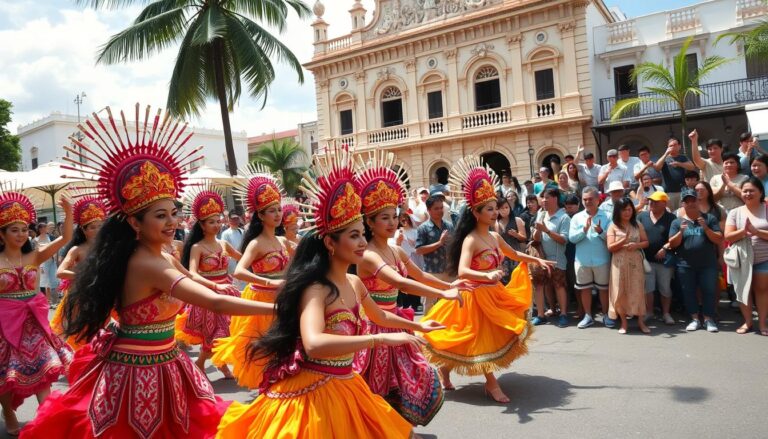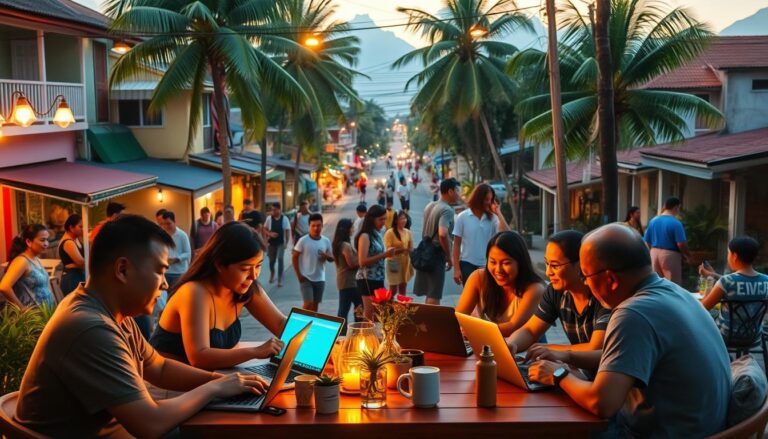Living Cost in Cebu for Canadian Digital Nomads
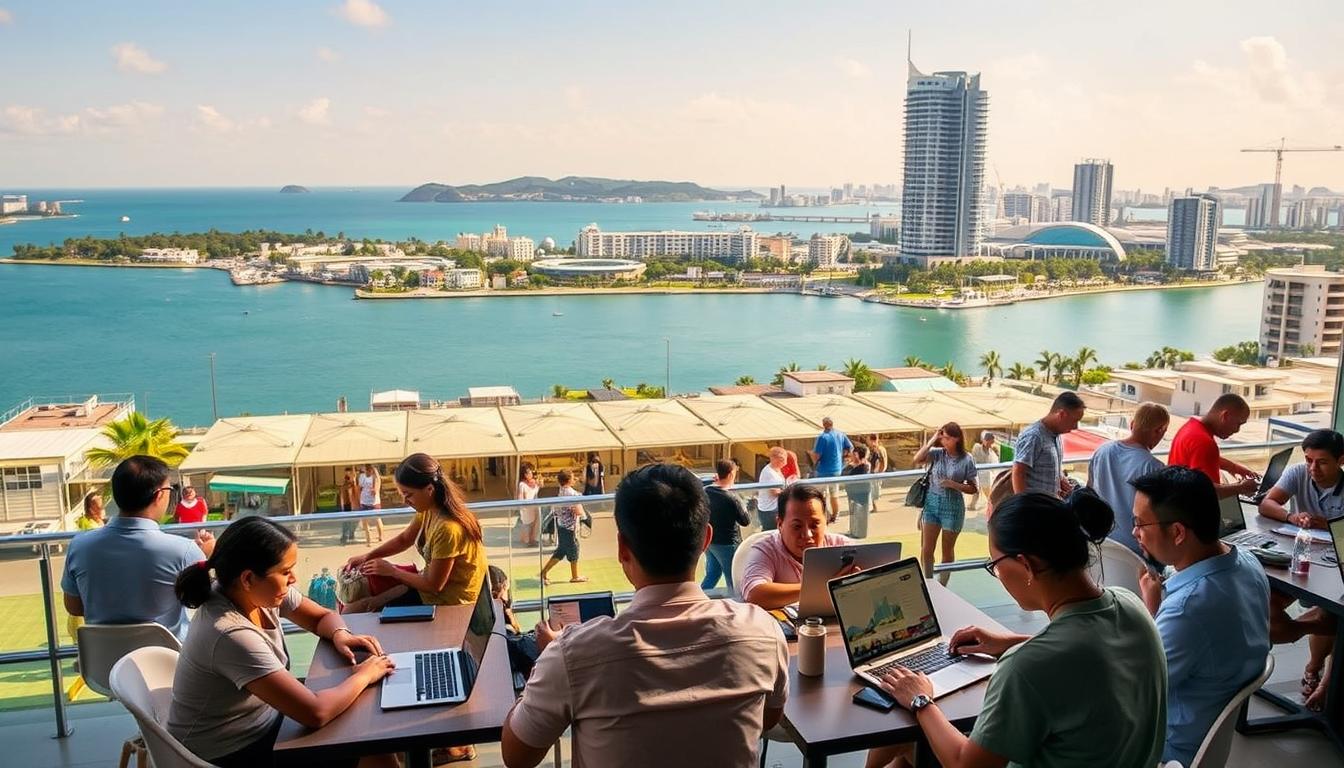
Welcome to your essential guide for exploring a new home base in the Philippines. This resource is tailored specifically for remote workers from Canada who are curious about life in a vibrant tropical city.
We will break down all the practical details you need to know. Our goal is to provide a realistic financial picture that goes beyond simple estimates.
This beautiful destination offers a unique blend of modern amenities and rich culture. The widespread use of English and a welcoming atmosphere make it an attractive spot for foreign professionals.
Whether you’re planning a brief visit or a longer stay, understanding your budget is key. This guide will help you make informed decisions for your journey ahead.
We cover everything from housing and food to workspaces and local regulations. Get ready to see how far your budget can stretch in one of Southeast Asia’s most exciting and affordable locations.
Key Takeaways
- This guide offers a detailed financial breakdown for remote professionals considering a move.
- Gain insights from real experiences of people who have made the city their home.
- The favorable exchange rate can significantly stretch your budget.
- English is widely spoken, easing the transition for newcomers.
- The city combines modern comforts with a rich cultural experience.
- Practical information on accommodation, dining, and workspaces is included.
- Understand the full scope of monthly expenses to plan effectively.
Introduction: Discovering Cebu on a Budget
For remote professionals seeking an ideal blend of work and play, Cebu presents an opportunity that’s hard to ignore. This city has firmly established itself as a top destination for those who want their income to work smarter, not harder.
Why Cebu is a Top Destination for Nomads
The appeal is clear. You can enjoy a standard of affordable living that would be unimaginable back home. This financial freedom allows you to save significantly or reinvest more into your projects.
Beyond the numbers, the city offers a perfect mix. You get reliable internet and modern cafes alongside breathtaking beaches and lush landscapes. This balance is a dream for any digital nomad.
Communication is a breeze, as English is commonly used everywhere. From setting up a bank account to chatting with locals, you’ll feel right at home. The visa process for Canadians is also refreshingly straightforward.
An Overview of What to Expect
This guide provides a realistic look at the cost living. We break down actual monthly expenses for accommodation, food, and transport.
You’ll find practical tips from seasoned nomads who call this place home. We cover the best neighborhoods and how to navigate the local scene with confidence.
Whether you prioritize budget-friendly options or prefer more luxury, this city caters to all. Get ready to plan your adventure with a clear and honest financial picture.
Understanding the Unique Appeal of Cebu for Canadian Nomads
What truly sets this Philippine island apart is its dual identity as a bustling metropolis and tropical escape. Cebu serves as both a modern technology hub and gateway to paradise, offering the best of both worlds.
Cultural and Lifestyle Attractions
The local lifestyle provides a refreshing change from fast-paced urban environments. You’ll find a more relaxed pace that still supports productive remote work.
As an island destination, weekend escapes are incredibly accessible. You can reach some of the world‘s most beautiful beaches within a short drive or boat ride from the city center.
The warmth of the locals creates a welcoming atmosphere that many find lacking elsewhere. Filipino hospitality is legendary, with people often going out of their way to make visitors feel at home.
Cebu’s cultural richness includes historical Spanish colonial sites and vibrant festivals throughout the year. The food scene is exceptional, particularly the famous lechon that draws enthusiasts from across the country.
For those prioritizing experiences, this destination offers incredible value. You can explore numerous tourist spots in Cebu and enjoy island hopping adventures at a fraction of typical costs.
Living Cost in Cebu for Canadian Digital Nomads: A Detailed Breakdown
Understanding your potential monthly expenses is the first step toward planning your tropical workation. Let’s examine real numbers from someone who recently completed a full month in this vibrant city.
The total monthly cost came to $1,023 USD, which demonstrates remarkable value. This comprehensive budget covered all essential expenses while allowing for comfortable living.
Monthly Budget Overview
Accommodation represented the largest portion at $460 USD. This shows that housing is typically your biggest investment when establishing your base.
Food and dining totaled $292 USD when combining restaurant meals and groceries. Transportation costs were surprisingly low at just $34 USD for the month.
Other necessary expenses included visa extensions ($55 USD) and mobile data ($10 USD). The remaining funds covered entertainment and miscellaneous items.
Your personal monthly cost will depend heavily on lifestyle preferences. Budget-conscious individuals might spend $900-$1,350 USD, while those preferring more comfort could reach $1,500-$3,000 USD.
The cost living cebu offers exceptional value compared to Western standards. This detailed breakdown proves that achieving a comfortable living cebu experience is entirely feasible on a reasonable budget.
Accommodation Options for Every Budget
Finding the perfect place to call home starts with understanding the diverse accommodation landscape. The rental market offers impressive choices that suit different preferences and financial situations.
Your housing decision significantly impacts your monthly expenses. From ultra-budget hostels to luxury high-rises, there are solutions for every type of remote professional.
Budget-Friendly Stays and Airbnbs
Budget-conscious individuals can find excellent value in local neighborhoods. A studio unit in areas like Labangon typically costs around $460 monthly through Airbnb.
These apartments often include full kitchens, air conditioning, and modern amenities. Living away from tourist centers provides authentic cultural immersion while saving $200-$400 monthly.
Mid-Range and Luxury Choices
For those seeking more comfort, mid-range options like Citadines Cebu City offer infinity pools and fitness centers. These typically range from $800-$1,200 monthly.
Luxury accommodations represent the high end of the spectrum. Properties like Fili Hotel at Nustar provide 5-star living with premium amenities for expat professionals.
| Accommodation Type | Average Monthly Cost | Key Features | Best For |
|---|---|---|---|
| Hostel Dorm | $120-$150 | Social atmosphere, basic amenities | Ultra-budget travelers |
| Local Studio | $400-$600 | Full kitchen, A/C, local neighborhood | Budget-conscious nomads |
| City Center Apartment | $800-$1,000 | Modern facilities, prime location | Convenience seekers |
| Luxury Condo/Hotel | $1,200-$2,000+ | Premium amenities, services | Comfort-focused professionals |
When selecting your accommodation, prioritize reliable internet and proper workspace setup. These factors greatly affect productivity during extended stays in the city.
Food and Dining: Sampling Cebu’s Culinary Scene
Cebu’s culinary landscape offers an adventure for every palate and budget. The local food scene represents one of the city’s greatest attractions, blending incredible affordability with unforgettable flavors.
Local Street Food and Markets
Street food culture thrives throughout the city. Vendors offer authentic Filipino dishes like dinuguan and humba at prices that make eating out economical.
Cebu is world-renowned for having the best lechon in the Philippines. Generous servings with rice and sides cost as little as $2.50. Local carinderias serve filling meals for $1.50-$3.00.
Restaurants and International Options
International cuisine is widely available but costs 2-3 times more than local food. Japanese, Korean, and Italian restaurants offer meals from $8-$15.
A realistic monthly dining budget of $197 allows regular eating out and occasional delivery. Coffee costs $0.67-$1.22 at local shops.
| Dining Option | Average Meal Cost | Best For |
|---|---|---|
| Street Food Stalls | $1.50-$3.00 | Authentic local experience |
| Carinderias | $2.00-$4.00 | Budget-conscious meals |
| Local Restaurants | $4.00-$7.00 | Balanced quality and value |
| International Dining | $8.00-$15.00 | Variety and comfort food |
The dining costs here allow food-loving visitors to explore Asia’s most underrated culinary scene. Local meals often cost less than a single coffee back home.
Transportation and Connectivity Costs
Navigating Cebu’s streets is surprisingly affordable and efficient for remote workers. The transportation system offers excellent value, with monthly costs averaging just $34 USD for most visitors.
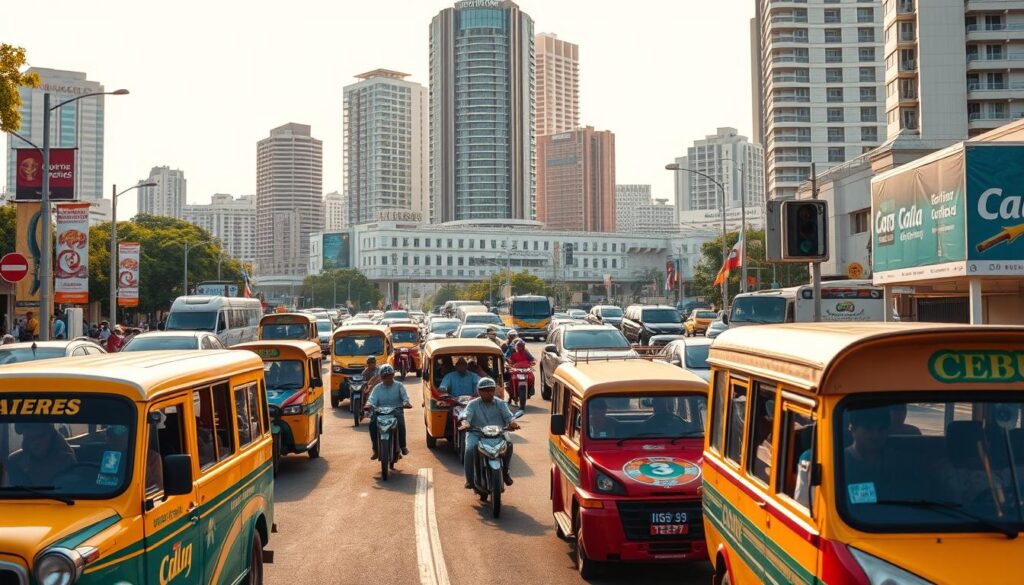
This budget covers a mix of ride-sharing and local transit. You’ll find diverse options that suit different preferences and schedules.
Public Transport and Ride-Sharing
Grab operates extensively throughout the urban center. This app provides safe, air-conditioned rides for $1-$3 per trip within the city.
Jeepneys represent the most budget-friendly choice. These colorful vehicles cost just a few pesos per ride. They cover virtually every neighborhood.
For short distances, tricycles and trisikads offer convenient service. They’re perfect when you need to avoid walking in the tropical heat.
Renting a scooter costs around $5 daily. This provides maximum flexibility for exploring beyond the urban area. Traffic patterns may differ from what you’re used to.
Domestic flights with carriers like Cebu Pacific enable affordable island hopping. Fares often start at $30 when booked ahead.
The time savings from using Grab versus public transit can be significant. Many professionals find the slightly higher cost worthwhile for productivity.
Digital Nomad Lifestyle: Balancing Work and Leisure
The ability to seamlessly blend professional responsibilities with tropical adventures defines the experience for remote workers. This unique lifestyle allows for productive mornings followed by afternoon beach sessions.
Finding this balance is made easier by the city’s infrastructure. Modern coworking spaces provide the professional environment needed for focused work.
Coworking Spaces and Internet Access
These shared offices are essential for many digital nomads. They offer high-speed fiber internet, which can be a challenge elsewhere in the country.
Having reliable access to a stable connection is non-negotiable for client calls and deadlines. Even nice condos can experience outages.
A smart strategy involves using a coworking space as a primary office. Keep mobile hotspots from both Globe and Smart as backups.
Memberships typically cost $50-$150 monthly. This investment safeguards your income and professional reputation.
The community within these coworking spaces is a major benefit. Regular events help combat isolation and build a network.
This supportive environment, combined with the island’s natural beauty, creates an ideal setting. It fosters a healthier integration of work and life than many traditional offices.
Visa and Legal Considerations for Extended Stays
Navigating visa regulations is often the biggest concern for remote workers considering extended time abroad. The good news is that the Philippines offers one of the most accessible systems in the region.
This tropical destination welcomes visitors from over 150 countries with straightforward entry requirements. The process is designed to be hassle-free for international professionals.
Visa-Free Entry and Extension Options
Canadian citizens enjoy 30-day visa-free entry to this beautiful country. Your passport must be valid for at least six months beyond your arrival date.
After the initial period, you can extend your stay at local immigration offices. The first extension typically costs around $55 and grants an additional 29 days.
Subsequent extensions become more flexible, allowing stays of 2-6 months at a time. Many nomads successfully extend their visas for up to three years without leaving the country.
Important Legal Tips for Nomads
Always carry proof of onward travel when entering the Philippines. Immigration officials may request to see your return or continuing ticket.
Budget for recurring visa extension fees throughout your stay. These costs are part of the overall expense of long-term travel in this destination.
Remote work for foreign clients is generally accepted on tourist visas. However, working for local companies requires proper work authorization.
The system here is refreshingly simple compared to many Southeast Asian countries. This makes planning extended stays much easier for international professionals.
Exploring Cebu City: Activities and Cultural Insights
Beyond work hours, Cebu City reveals itself as a playground of cultural discoveries and unforgettable experiences. The city’s rich tapestry of Asian, Spanish, and American influences creates a fascinating backdrop for exploration.
Affordable adventures await around every corner. Most activities cost significantly less than comparable experiences in Western countries.
Local Experiences and Food Tours
Guided street food tours offer incredible value at around $31. These experiences provide safe introductions to authentic Filipino cuisine. Knowledgeable guides like Prue transform meals into cultural journeys.
“The storytelling and context made each dish come alive,” one visitor noted about their food tour experience.
Historical sites like Magellan’s Cross and Fort San Pedro offer free or low-cost things to do. The Basilica del Santo Niño provides insight into religious heritage.
Weekend excursions to waterfalls and islands typically cost $30-$100. The local food scene serves as both entertainment and cultural education.
Exploring Cebu City means discovering a world where every activity tells a story. The combination of affordability and rich experiences makes this destination truly special for any visitor.
Comparing Cost of Living in Cebu with Other Philippine Cities
The financial landscape across Philippine urban areas varies significantly, offering distinct advantages depending on your priorities and budget. Each location presents unique value propositions beyond simple expense comparisons.
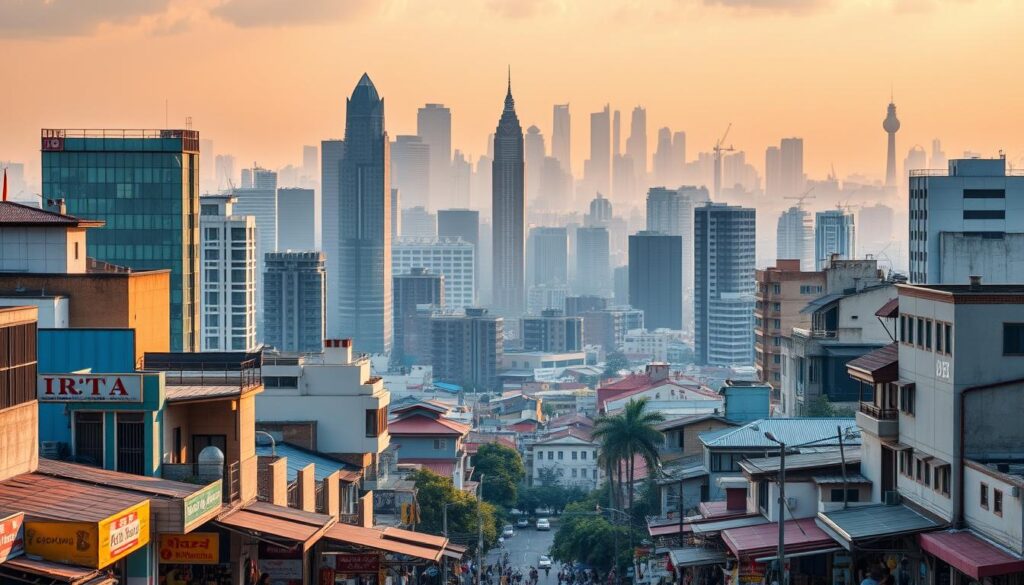
Manila, Baguio, Davao and Beyond
Manila stands as the most expensive among major cities, with monthly expenses around $1,460 for expatriates. The capital offers superior international connectivity and business infrastructure.
Cebu City occupies a comfortable middle ground financially. It provides better value than Manila while maintaining robust amenities and beach access.
Davao emerges as the most budget-friendly option among these cities. Its lower housing costs make it attractive for those prioritizing savings.
Baguio offers a different lifestyle with cooler temperatures and student culture. Each of these cities caters to specific preferences beyond pure financial considerations.
The region of Southeast Asia generally maintains similar affordability levels. However, the Philippines distinguishes itself through English proficiency and cultural factors.
When evaluating these urban centers, consider both visible and hidden expenses. Traffic patterns, climate needs, and local amenities all impact your actual monthly budget.
Practical Tips for Affordable Living in Cebu
The secret to stretching your budget lies in adopting local habits and avoiding common newcomer pitfalls. Smart choices can make your low cost living experience both comfortable and financially sustainable.
Banking fees can add up quickly. Philippine banks charge about $3 per foreign card withdrawal. Always take out the maximum amount allowed to minimize transaction fees.
Your neighborhood choice significantly impacts expenses. Areas like Labangon offer much better value than pricier expat zones. Rent differences can reach $200-$400 monthly.
Food strategy is crucial for affordable living. Local carinderias serve delicious meals for $2-$4, while international restaurants cost 2-3 times more. Embrace Filipino cuisine to save substantially.
Accommodation tips from experienced nomads:
- Negotiate monthly rates directly with landlords
- Verify hot water availability in rental units
- Ensure proper workspace with ergonomic chairs
- Book longer stays for 30-50% discounts
Connectivity is essential for remote work. Carry both Globe and Smart SIM cards for reliable coverage. Grab deliveries offer convenient low cost meal options when cooking isn’t practical.
These practical strategies make living cebu achievable on various budgets. The initial learning curve pays off through significant monthly savings.
Resources and Further Reading on Low Cost Living
To truly master your budget and lifestyle in this tropical destination, having the right tools and resources at your fingertips is essential. These platforms provide real-time data and community insights that go beyond basic travel guides.
Accurate information helps you make smart financial decisions. The following resources have proven invaluable for remote professionals establishing their base here.
Helpful Guides and Websites
NomadList.com offers crowd-sourced data on expenses from actual digital nomads currently in the area. This guide provides real-time cost tracking and internet speed ratings.
Personal blogs from experienced nomads offer honest perspectives on both advantages and challenges. They provide context you won’t find in generic travel guide materials.
For official information, the Bureau of Immigration website provides accurate visa requirements. Digital nomad forums serve as excellent resources for current accommodation recommendations.
Essential platforms for your research include:
- Teleport and Numbeo for city comparisons
- Airbnb and Booking.com for accommodation deals
- Viator for curated local activities
- Grab app for transportation and food delivery
These resources help create a realistic picture of the cost living situation. They transform uncertainty into confident planning for your new home base.
YouTube channels from fellow digital nomads offer visual guides to everything from apartment hunting to coworking spaces. This visual context complements written resources perfectly.
Conclusion
Cebu City stands out as a remarkable choice for location-independent professionals seeking both value and adventure. The documented monthly cost of around $1,023 USD proves that a comfortable lifestyle is achievable on a reasonable budget.
This vibrant destination offers the perfect blend of urban convenience and natural beauty. Digital nomads enjoy productive work environments while having stunning islands just a short trip away.
The growing community of expats and fellow remote workers provides invaluable support. This makes settling into the city much smoother for newcomers.
With straightforward visa processes and widespread English, the transition is remarkably simple. The quality of life improvement represents more than just financial savings.
For those considering a move, Cebu delivers on its promise of an enriching experience. It combines practical affordability with unforgettable cultural immersion.
FAQ
What is the average monthly cost of living in Cebu for a Canadian digital nomad?
FAQ
What is the average monthly cost of living in Cebu for a Canadian digital nomad?
A comfortable monthly budget can range from 0 to
FAQ
What is the average monthly cost of living in Cebu for a Canadian digital nomad?
A comfortable monthly budget can range from $800 to $1,500 USD. This covers a nice apartment, delicious food, coworking space access, and leisure activities. It’s significantly more affordable than major cities in Canada.
How reliable is the internet for remote work in Cebu City?
Internet connectivity is generally very good, especially in urban areas. Most coworking spaces offer high-speed fiber optic connections. Apartments often have reliable broadband, making it easy to stay productive.
What are the best areas in Cebu for digital nomads to live?
Popular neighborhoods include IT Park and Lahug for their proximity to coworking hubs and cafes. Mandaue City offers more residential options, while areas near the beach like Mactan provide a resort-style lifestyle.
What visa options are available for Canadians wanting to stay long-term?
Canadians initially get 29 days visa-free. You can extend this for up to 3 years through a Tourist Visa extension process. For longer stays, exploring a Special Resident Retiree’s Visa (SRRV) is an option.
Is it easy to find affordable and healthy food options?
Absolutely! Local markets and street food offer incredibly cheap and fresh meals. There’s also a growing number of health-conscious restaurants and international grocery stores for all your dining needs.
How does the cost of living in Cebu compare to Manila?
Cebu is generally more affordable than Manila, especially for accommodation. You’ll get more space for your money, and the overall pace of life is often considered more relaxed and enjoyable.
What is the best way to get around the city and island?
Ride-sharing apps like Grab are convenient. For a local experience, jeepneys and taxis are very affordable. For exploring the beautiful beaches and islands, buses and ferries are your best bet.
,500 USD. This covers a nice apartment, delicious food, coworking space access, and leisure activities. It’s significantly more affordable than major cities in Canada.
How reliable is the internet for remote work in Cebu City?
Internet connectivity is generally very good, especially in urban areas. Most coworking spaces offer high-speed fiber optic connections. Apartments often have reliable broadband, making it easy to stay productive.
What are the best areas in Cebu for digital nomads to live?
Popular neighborhoods include IT Park and Lahug for their proximity to coworking hubs and cafes. Mandaue City offers more residential options, while areas near the beach like Mactan provide a resort-style lifestyle.
What visa options are available for Canadians wanting to stay long-term?
Canadians initially get 29 days visa-free. You can extend this for up to 3 years through a Tourist Visa extension process. For longer stays, exploring a Special Resident Retiree’s Visa (SRRV) is an option.
Is it easy to find affordable and healthy food options?
Absolutely! Local markets and street food offer incredibly cheap and fresh meals. There’s also a growing number of health-conscious restaurants and international grocery stores for all your dining needs.
How does the cost of living in Cebu compare to Manila?
Cebu is generally more affordable than Manila, especially for accommodation. You’ll get more space for your money, and the overall pace of life is often considered more relaxed and enjoyable.
What is the best way to get around the city and island?
Ride-sharing apps like Grab are convenient. For a local experience, jeepneys and taxis are very affordable. For exploring the beautiful beaches and islands, buses and ferries are your best bet.


